
17 minute read
Good Grief: Life After Loss
Part One Of Two
As weighty a topic as grief can be, I felt compelled to address it as we approach National Grief Awareness Day on August 30. I wanted to provide support to those who are weathering losses. Even when life delivers one of its most powerful blows, we can share in the certainty that we will regain our equilibrium. Opening up a space to discuss bereavement has been cathartic for contributors sharing their stories and will be for those who read them. Talking about loss is healing, even as tears are choked back at times. For readers enduring their own losses, there is comfort in the simple reassurance that we’re not alone.
Grief is unavoidable; it’s part and parcel of the human condition, the inevitable equalizer across the board in the game of life. We’re all bound to experience the tragedy and melancholy of having lost loved ones and tasked with picking up the remaining pieces of our lives to continue our journey without them.
How we deal with grief depends in large part on our personality and the relationship we had with the deceased. Thus, the process is singular to each of us. There can be no one-size-fits-all type of guide.
Losing a spouse can leave one person feeling shattered while another may face the same loss without much incident. The loss of a parent can result in one sibling handling it more easily than another, although they’ve lost the same person.

By Patrizia Winsper
Neither reaction is right or wrong. Grief is as individual as our fingerprints. No two people will move through it in the same way.
Consider this two-part article an invitation to give yourself grace while navigating the harrowing journey through loss. Provided no one is being harmed, it’s important to recognize first and foremost that all grief is “good grief.”
Get by with a little help from your friends – and a professional
When it comes to death, as prevalent as it is, we can all be pretty terrible at dealing with it, whether we’re experiencing the loss or trying to comfort someone else. Advice from a pro can go a long way when we don’t know the best things to say or do.
To that end, Danielle Edwards, MSW, LCSW, of Edwards Psychotherapy and Consulting LLC, a grief, trauma and domestic violence recovery therapist, was kind enough to share her expertise.
First and foremost, Edwards advises any bereaved individuals struggling with thoughts of suicide to call or text 988, the Suicide and Crisis Lifeline, or to go to the nearest ER.

“Denial, Anger, Bargaining, Depression, Acceptance — the stages of grief. I don’t use them. There’s this idea that you’re supposed to move through denial, anger and once you hit acceptance, you can tie it all up and put it on a shelf. But it’s not a linear process,” Edwards said.
She advises people that they should eliminate any expectation that they should be further along. “There’s nothing wrong with you, you’re not off track, your journey may be riddled with detours and U-turns. Expect a slew of other pitstops along the way like remorse and relief, that can also be part of your experience,” she added.
Mayor of Peachtree Corners, Mike Mason
Toiling in the garden, Peachtree Corners Mayor Mike Mason paused to survey his work and asked aloud, although he’s alone, “Well honey, what do you think? How does that look?” Having lost his beloved wife of 49 years this past January to an aggressive form of uterine cancer, he is left to only hope the late first lady of the city, Debbie Mason, would approve.
Maintaining their beautiful garden is a labor of love and one way Mason honors his late wife. “We created a habitat in our backyard for birds, squirrels, pollinators and predators. From the sunroom, you can appreciate the color palette and shapes of the pots and flowers,” Mason said.
He recalls telling Debbie, who was always at the helm of their projects, that she was an artist, painting with landscape, hardscape and texture. She had responded, “I’m glad you see that.”
Grandiose memorial suggestions from well-meaning constituents, like naming the bridge or City Hall after Debbie, did not appeal to Mayor Mason. He doesn’t feel they’d accurately capture her essence. The City of Peachtree Corners will soon announce what is yet to blossom in the first lady’s memory.
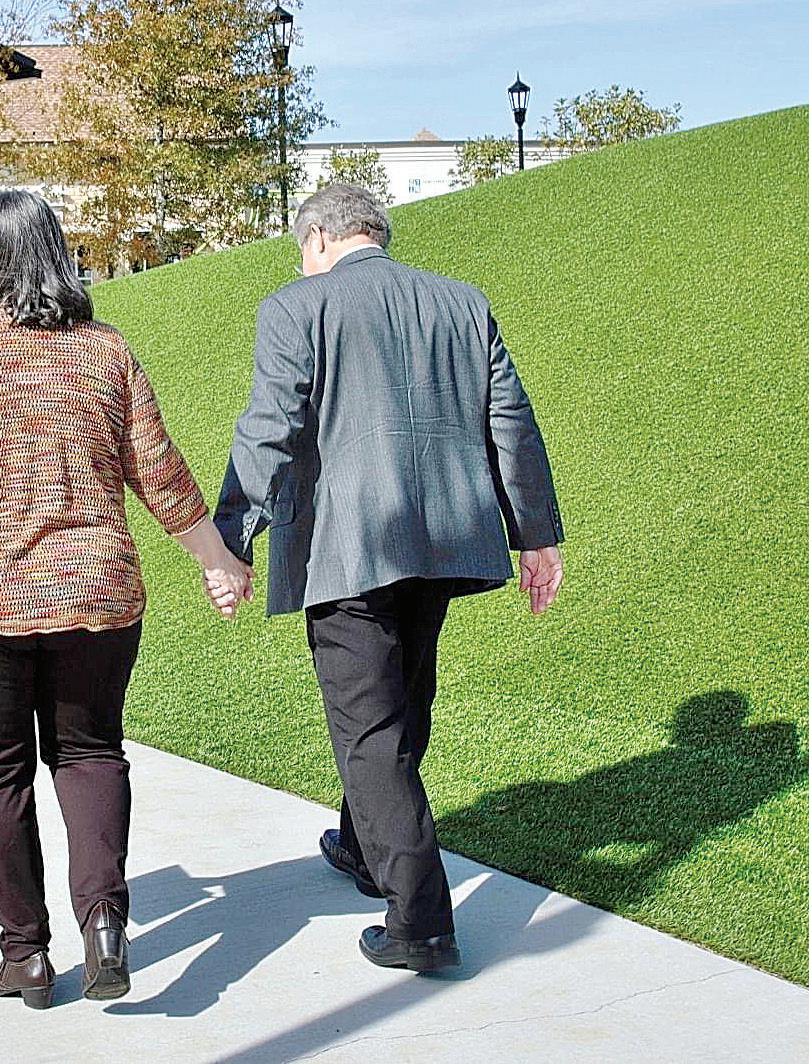
In the meantime, Mason actively seeks healing through group counseling at the YMCA and reading books like Alan D. Wolfelt’s, “Healing a Spouse’s Grieving Heart.” He has graciously agreed to share some personal anecdotes in hopes of helping others.
Work through it
In moments when tears cannot be contained, Mason has learned to embrace the process of grieving. After gardening, you might find him tearfully sipping wine, reminiscing about how he and Debbie once delighted in that effort together.
Hearing a country western song while driving may require him to pull over. Listening to artists that Debbie loved from his vinyl collection, like Linda Ronstadt, cues the waterworks.
YMCA Grief counselor, Elli Garrett, sagely advised him, “You can’t stop listening to the music you love. You’ve got to work through the grief, keep experiencing life the way you and your partner did. Right now, those thoughts make you cry, but even- tually listening to those songs will make you feel better because they remind you of her. You have to work through the grief to get to that point.”
Attempting to recover from the jolt of facing life devoid of the emotional intimacy he once enjoyed with his best friend, Mason repeats the mantra, “work through it,” as he continues.
“Move on means you’re trying to leave something behind. That’s the wrong approach. You have to continue. Ask yourself, ‘What’s next?’ and plan it,” Mason said.
Mission impossible
Though wanting desperately to change Debbie’s circumstances, her illness was complicated by side effects and a stroke. Based on his research, the plan was to get her into remission and have five more years of seeing her smile, holding hands, flirting, snuggling and the daily tête-à-têtes with the partner he had built a life with as they worked together to create the City of Peachtree Corners.
“Nobody’s kidding themselves. There wouldn’t be a city without Debbie Mason,” he stated.
He had remained laser focused on being a cheerleader and would’ve done so forever if it would keep her alive. But two years after her diagnosis, Debbie was gone, leaving Mason to feel like he had somehow failed.
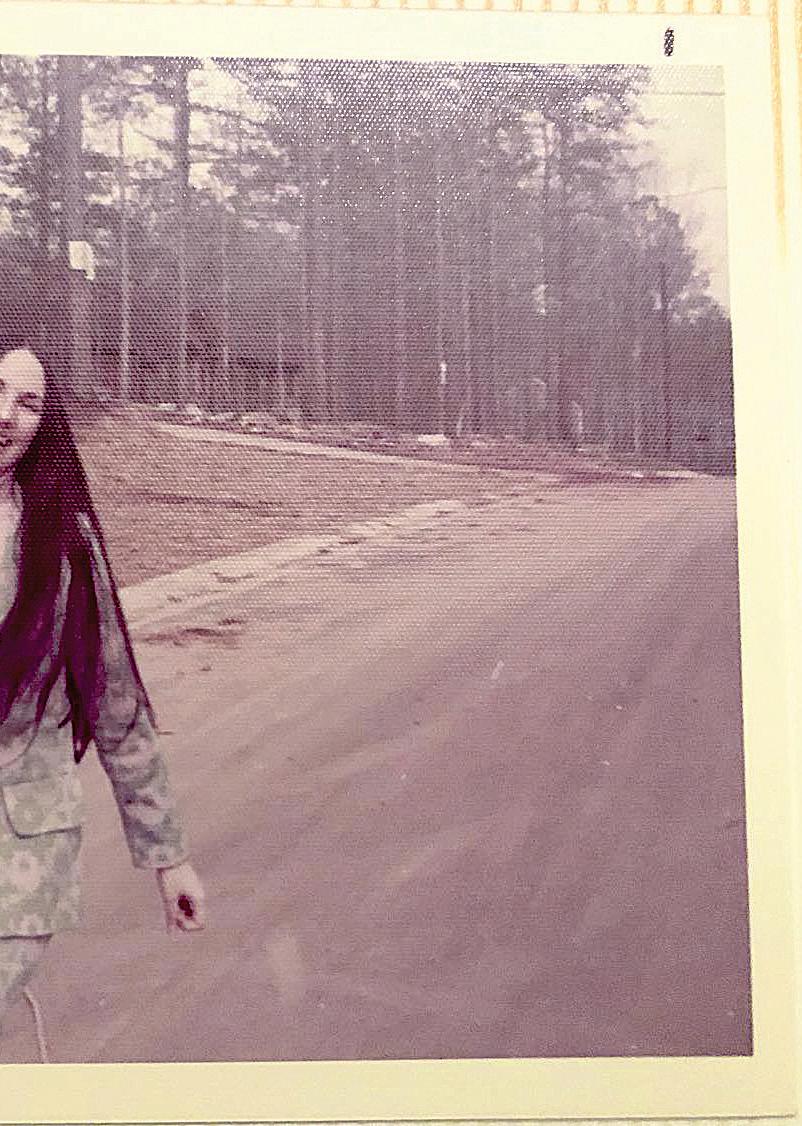
“My mission was gone. That’s a loss, too. Taking care of her didn’t work. Now I have to do what she told me several times towards the end: start thinking of the future,” he recounted.
Unable to think of life beyond Debbie until there was no choice, Mason abruptly met with solitude. “You wake up after the funeral, after everybody has gone back to their homes, and it’s just you and the house. All of a sudden, the house is quiet, the bed is empty,” he shared.
Facing the new normal is physically and emotionally exerting. As Edwards informed me, there’s no white knuckling someone’s passing, it doesn’t go away.
“Make room for the grief. Tend to it,” she said. And the mayor is doing just that.
Late night visits from the past
For Mason, the most difficult part of grieving has been the sleepless nights.
“Grief is insomnia,” he said. “Your mind won’t stop. You can be very sleepy, lay down and then, all of a sudden, you wake up and it’s that never-ending woulda, shoulda, coulda. It doesn’t matter that you intellectually understand [you shouldn’t do this]. You have to reason with yourself at two in the morning.”
Tormented by things he wishes he had done differently, Mason reviews past incidents. “People change. You’re not the same person now as you were when you first married. That’s where my mind goes — how I would’ve handled things as the man I am now,” he said.
Recognizing one should only learn from the past — it’s futile to beat yourself up about it — he endeavors to focus on today and tomorrow. “You can’t change it. Forgive yourself. Don’t make those mistakes again. Relentlessly remind yourself of that,” he said.
On a lighter note, one that couples can appreciate, the mayor realizes that if Debbie were aware of what he’s wracking his brain over today, she’d probably laugh and remind him of incidents he hasn’t even thought of yet.
Being a caregiver will change you
The difficulty of providing the most intimate care while watching a loved one as they’re ravaged by an unstoppable disease leaves a mark. Supporting the emotional and physical needs of a spouse at their most vulnerable, as they become forcibly dependent due to sickness and approaching death, imposes a disarming honesty and frankness. resolving any differences. a long sigh. That’s how she passed. It was a moment of love,” he said. “You do the best you can for as long as you can and then you continue.”
“You will not be the same person. I don’t have much of a filter anymore. It’s not normal for a politician,” Mason said.
Nick, however, had a more confrontational approach growing up. “He and Debbie could really push each other’s buttons,” Mason shared. Cancer didn’t leave much time for reconciliation. Though Nick is content with how things concluded, any residual burdens will be discussed with a therapist.
The Mason jar gets bigger and having new experiences is allowing for Mason to slowly grow around his grief, like the Mason jar imagery.
Forced to slow down while providing end of life care, the mayor has also noticed a change in his formerly fast-paced, herky-jerky ways. Now he adopts more of an unhurried disposition.
According to Edwards, some may wish to return to the person they were before the loss. But loss becomes part of your journey, and it does change you. The only question should be, “What does moving forward look like?”
“I love you in spite of, not especially because.”
It’s a family saying, or “Debbieism,” used in times of disagreement when the late first lady reprimanded their sons about things she may not have approved of. “‘I love you in spite of, not especially because.’ The three of us were outmatched by her,” the mayor reminisced.
Masons’ sons had markedly different reactions to the loss of their mother, in keeping with their own temperaments and individual bonds with her.
The eldest, Matt, spoke to Debbie before she passed and came out saying, “We’re OK.” He had become skilled at speaking to his mother in his best “help desk voice” whether assisting her with technology or
We’ve been friends through rain or shine for such a long, long time – Gordon
Lightfoot
Remembering how Debbie left this world provides some comfort. “It ended well,” the mayor said. He stopped everything for two and a half years to focus first on saving her, and then on taking care of her.
“She knew I loved her, and it ended that way,” Mason said. He had given her a dose of morphine for the pain and helped her to relax with her favorite, a soothing foot rub.
“I touched her as gently as I could and said, ‘There you are sweetie, a good foot rub. Nothing like that to make a girl take a nap.’ She took a deep breath and let out
Edwards shared an uplifting visual. Picture a series of three Mason jars, each with a black ball of grief inside. The grief appears to get smaller from left to right, but in truth, it is the Mason jars that are getting progressively larger.
“People think grief will get smaller and smaller. But we grow around our grief. The jars get larger. Grief remains; we change and grow around it,” Edwards said.
Physical separation is difficult but personal growth still occurs after losing someone we love. There will be enjoyment again.
Edwards suggests releasing any guilt you may feel for having joyful moments because the deceased can’t share them with you. Embrace new people and new challenges. Do the things you’ve always enjoyed.
Developing new social contacts
He found this message communicated to him by Pastor Lori Osborn at Mount Carmel Church, to be most helpful. “The reason why, right now, talking to your friends is so hurtful, your grief is so profound, is that you live in a world where all your friends knew Debbie. Keep meeting new people so the size of your group of friends expands to include people who didn’t know her — you won’t leave them crying. Don’t be afraid to do new things,” Mason recounted.
When asked for any advice he’d like to share with mourners, he replied, “Get up every morning and try to do just that, but be kind to yourself. If you had planned to do something and suddenly you don’t want to, change the plan. Do the stuff you loved before.”
As for the mayor, he’s benefitted from a return to listening to music, perusing bookstores and reading. He is determined to keep his set point at happy and positive. It’s no easy task for the man who had tissues at the ready when he teared up during our interview.
“You get a little battered, bruised, but have to stand up and regain your balance. You can’t be a good partner if you’re too dependent upon the other person, but you do connect and lean on each other,” he said.
Feeling esteem for our city leader who so dearly loved his wife, it is my most sincere wish that when he’s ready, Mayor Mason will find a new partner with whom to create traditions and make memories, just as his departed wife had wished for him.
Caroline Manning
Caroline Manning lost her husband of 42 years in 2018. Thoroughly entrenched in the community, when he wasn’t at his law firm, John coached baseball and played tennis. He was the first Chairman of the Board at the Robert Fowler YMCA where he served on multiple committees thereafter.

He also hosted the Good Friday breakfast for thousands of people and delivered sermons to the children at Simpsonwood United Methodist Church every Sunday for 30 years. Needless to say, John was a busy man.
He died as he lived, assisting others. He was having fun with dear friends while helping a parishioner who had been evicted. They were boxing and transporting her belongings to an apartment on a hot September day. John, who had lived with Type 2 diabetes for 25 years, was seen jovially directing traffic. No one noticed he was declining.


In addition to taking insulin to keep blood sugar levels steady, diabetics must also remain vigilant and eat at certain times. Thinking he’d be home by noon, John had overextended himself in the warm weather, likely fueled only by a donut breakfast with his church group.
Probably feeling shaky by 2:00 in the afternoon as his blood sugar plummeted, he announced he was going to get something to eat.
“He was too busy to pay attention. He knew how to deal with it but would get so wrapped up in whatever project he was involved in. I would say, ‘John, you’re a grown man. If you feel bad, you need to stop and get something to eat.’ This was before FreeStyle Libre that checks your blood sugar and keeps you posted,” Caroline said.
At home preparing to receive guests, Caroline was contacted by a Duluth policeman with news that John had gone to Burger King, choked and passed out. Someone performed the Heimlich maneuver and John was rushed to Joan Glancy Memorial Hospital.
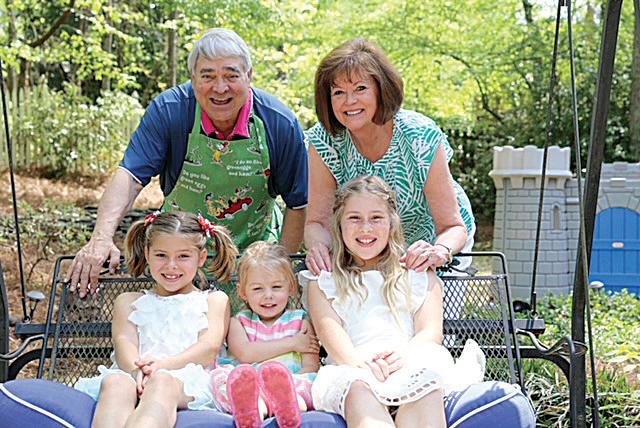
She was told to get to the hospital immediately.
The unexpected
Upon arrival, the receptionist sent her to a room. When a grief counselor introduced herself, Caroline thought she must have the wrong person.
Then the doctor came in and abruptly delivered the message, “I’m sorry to tell you this, Mrs. Manning, but your husband has passed away.” The choking had caused a heart attack. John was 70.
Caroline alerted the church that John wouldn’t be giving the Sunday sermon. She and her daughter Catherine fielded a barrage of questions as doctors sought to determine the cause of death. Her eldest, Sarah Frances, rushed home from Hilton Head.
Anticipatory grief
Edwards explained anticipatory grief. If you can see it coming, whether it’s a terminal illness, an addiction, a loved one’s behavior that could cause their demise, grieving begins while the person is still alive.
“When you fear you’re losing this person, in the back of your mind you know unless something changes, this is likely going to end in their death, you’re already grieving,” Edwards said.
Those suffering anticipatory grief may wonder why they’re not more sorrowful once the individual passes away. “I ask clients to tell me about before. Before was full of so much grief or worry. After- to beep at him, Caroline shared, “We worried constantly. He’d stay too long at the office or go to a meeting and not eat. By the time he’d get home, he’d be shaking and sweating. We’d get mad.”
Fearing the worst, Caroline insisted on moving his office from Buckhead back to Peachtree Corners; John was having episodes of feeling light-headed driving home.
She had asked him, just months before he passed, what his wishes would be for his funeral. She knew he’d have specific requests for songs and Bible verses, and she noted those.
Losing a patriarch
John’s departure was swift. “Because we didn’t see any suffering, what we had to do is learn to live without him,” Caroline said.
She was at ease assuming the role of hostess. “People were coming over. I was explaining what had happened and making everyone feel comfortable,” she said.
Sarah Frances, who worked in public relations at the time, kicked into PR mode. She wrote the obituary, planned the funeral, created the program and contacted everyone. She was in full-blown funeral mode.
comments like, “I’d just get a Coke and a candy bar to bring my blood sugar levels up,” Caroline said.
Wives reached out declaring they had never fretted, having no idea this could happen. “I don’t know what doctors are doing wrong. People think they can eat and do whatever they want, as long as they’re taking meds. So much to learn,” Caroline sighed.
Count your
blessings
John’s doctor provided some consolation, pointing out that he could’ve gone into a coma. “I firmly believe God took him quickly as opposed to letting him stay in a coma. He would not have liked to have a debilitating disease. He died the way he would’ve wanted — doing what he loved with people he loved — and not in bed, sick,” Caroline said.
“He was never sick. He never missed church or work. I think we’d all hope to die like that — quickly, no suffering, no putting your family through struggles. I count that as a blessing,” she added.
No time for a meltdown
Fraught with projects, there was no time to stop. It was likely wards, it’s almost like a sigh of relief. Grief is more than sadness,” Edwards said.
After the initial shock, Caroline experienced a sense of calm. It was the end of her distress every time John left the house. She no longer had to worry about him living on the edge. It may seem unusual to those unfamiliar with this phenomenon, but it is indeed, part of grief.
She and her daughters had witnessed more of John’s risky behavior and cautioned him repeatedly.
Wishing he’d had FreeStyle Libre
“That’s how Sara Frances handled her grief. She wanted it to be the most perfect funeral, if there is such a thing,” Caroline said.
Diabetes can kill you
Stressing the seriousness of diabetes — a disease that can unexpectedly kill you — Sarah Frances also contributed to a cautionary article for a legal publication. The response was surprising. Caroline heard from several attorneys with Type 2 diabetes who never thought they could die from it.
The family was stunned by self-preservation that had her functioning on autopilot. “I didn’t have a real meltdown,” Caroline said.
She’d been suggesting they downsize and encouraging John to either close his office or work from home for years. Not wanting the task of maintaining their family home alone, Caroline was quick to get it on the market.
She also closed down John’s law firm. It was a daunting undertaking; he had practiced for over 40 years.
Just days prior to his passing away, the couple had started cleaning out their basement — a job she was left to complete on her own.
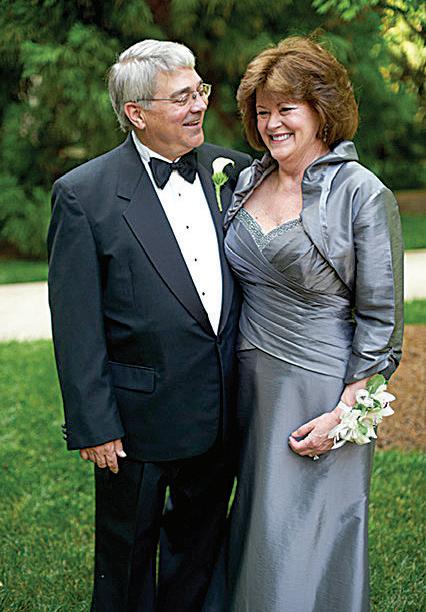
Same loss, different grief

“I had all those projects lined up. I was consumed with all that. I think the girls have struggled more than I have. They were both very close to their dad,” Caroline said.
Each of the Mannings’ daughters would tell you they were John’s favorite. Sarah Frances, who inherited John’s exuberant personality, sought grief counseling.
Advice
Selecting Crowell Brothers Funeral Home on Peachtree Industrial Boulevard proved to be beneficial. “They were wonderful to work with. They handled everything,” Caroline said.

They fought for three months to obtain the certificate of death without which one cannot sell property or collect life insurance. They remained in constant contact with Caroline, who deems them “fabulous.”
According to Caroline, grief must be processed one step at a time. She has moved from one step to the next with the help of her girls and her grand-girls, who are a huge part of her life.
“I’m loving being in charge,” she chuckled.
The company of a man
When Caroline and John were together, the couple enjoyed mutual respect and a lot of fun. They loved cooking and entertaining, music and theatre.
Caroline misses his humor, companionship and the fun surprises he’d plan, like scavenger hunts and progressive dinners spanning multiple restaurants.
“John liked to go and do,” Caroline smiled. “Not having any men in my life has been challenging. They do bring a lot. I’m only now reaching that point.”
New life
“I feel like I am where I’m supposed to be,” Caroline shared.
She’s moved to a home she loves in a conveniently located neighborhood of both young families and empty nesters. “It’s a nice mix. A great group of people. The women get together for happy hour at the pool,” she said.
Embracing a new career, Caroline adores substitute teaching at her granddaughters’ school. They bring their friends by to meet their “Mimi.”
Caroline is ready for the next chapter in her life.
Selling your business is a big decision. Equally important is finding the right business advisor to help you navigate the process. When you select Transworld our latest Market Report shows you’re choosing the best. It’s been two years of historic performance levels for Transworld. Not only was 2021 record-setting with 31% more deals closed versus 2020, but 2022 surpassed it by 62%. The total deal value of businesses increased, too, by more than 25%. The 2022 monthly breakdown of sold deals topped every month in 2021, with 10 of the 12 months showing double-digit increases.
If all this information leads you to think the time might be right for you to sell your business, the experts at Transworld can help you get all your business’s legal or financial records in order and recommend any additional experts, such as accountants or lawyers, you may need. They will also help you package and market your business throughout the world to find the best buyer.
ANN BARHAM ABarham@tworld.com
Decisions, decisions
The hardest thing for Caroline was facing choices alone. She was glad to have the support of her daughters.
“When you’ve been married for 42 years, the hardest thing is making a decision by myself,” Caroline revealed.
Without an equal partner to help weigh ideas, she realized that whatever happened going forward, was going to be her call. It was daunting at first, but now she’s more comfortable with it.
Bottom line
Tomorrow is not promised to anyone. Tell your people how much you love them often and treasure the special moments you are able to share with them.
Part 2 of Life After Loss is scheduled to appear in the next issue of Peachtree Corners Magazine. ■
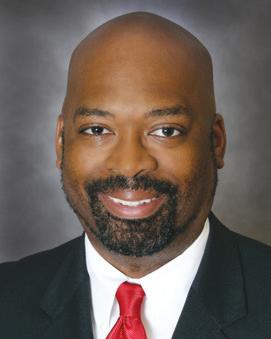
KARL BARHAM KBarham@tworld.com
If you think selling is on the horizon for your business, consider the experts at Transworld. We can help guide you through the process from start to finish. You may want to consider talking to a Transworld Business Advisor for a complementary valuation while the market is hot. Explore your options by giving us a call 770-766-9855 or email atlantapeachtree@tworld.com today!











